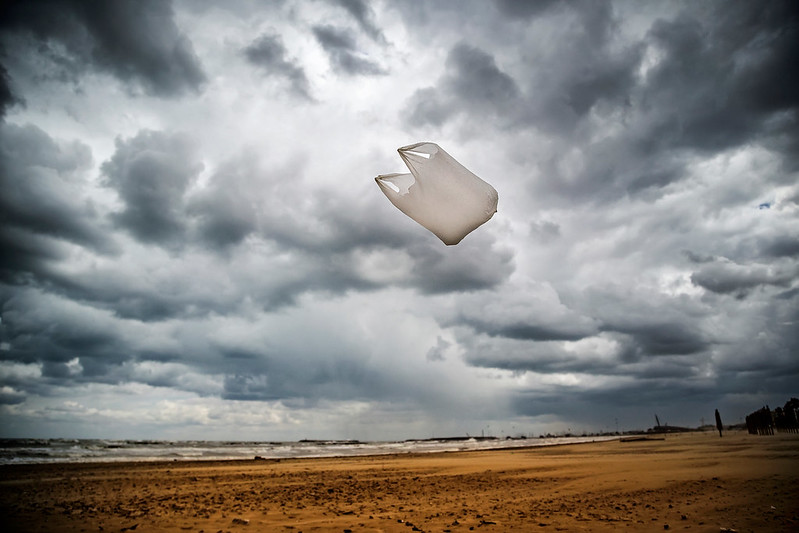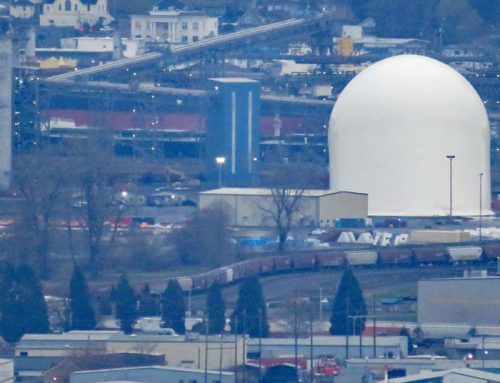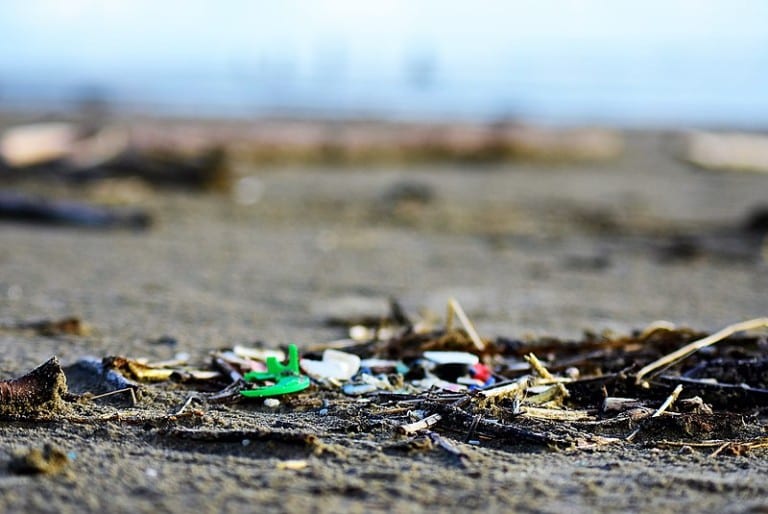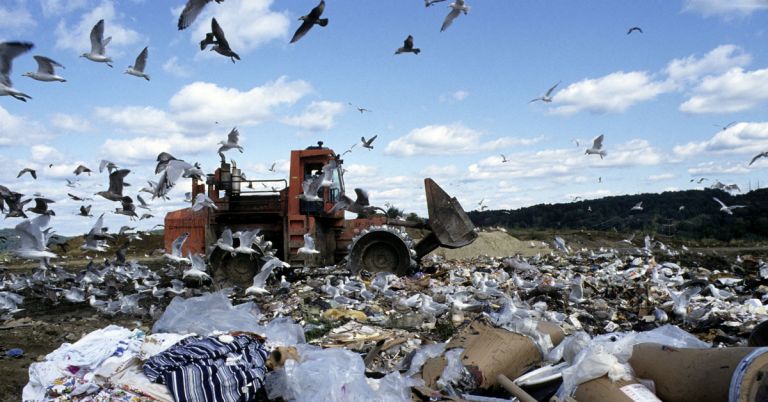
Photo courtesy of Flickr
By Dac Collins. Oct. 10, 2019. It seems likely that the City of White Salmon will be the 34th municipality in the State of Washington to enact some variation of a plastic bag ban. The vast majority of local residents and businesses support the idea, as most people can agree that getting rid of singe-use plastic bags is a sound waste management strategy and an important step toward decreasing the overwhelming amount of plastic currently disrupting our environment.
But due to a sticking point over how the policy should be implemented, the passage of the Checkout Bag Ordinance is still not a certainty.
During a public hearing that took place on Oct. 2, Mayor David Poucher threatened to veto the City Council’s unanimous decision to pass the ordinance, arguing that he was speaking up for the silent majority that did not attend the hearing. The mayor has until the close of business on Friday, Oct. 11, to decide whether he will veto the City Council’s decision or sign the ordinance.
Taking shape
This unexpected twist came as a shock to the nearly 30 people who showed up to the hearing to support the ordinance. That group included Becky Miles, who founded the group Community Upcycle in January in order to combat the growing problem of single-use plastic and push for some commonsense legislation around the issue.
Miles says their push for a local bag ban was initially put on hold as the Washington legislature considered a more expansive bill that would ban single-use plastic bags statewide. But when Senate Bill 5323 died in the House during the eleventh hour of the legislative session, Miles says the group “kicked right back into action.”
“We started drafting an ordinance,” Miles explains, “and we worked really closely with the Washington Industry Food Association and Zero Waste of Washington.”
The Checkout Bag Ordinance, as it is currently written, is not an all-out ban on plastic bags. Instead, it increases the criteria for the paper and plastic bags that are made available to consumers, requiring that both paper and plastic bags are recyclable, are made of at least 40% recycled material, and (in the case of plastic) are sturdy enough to be reused at least 125 times. The ordinance would also require shoppers to pay a 10 cent fee for each bag used during checkout.
“The idea is to raise the bar so that the products offered are made of more recycled content and are more reusable. It’s a good waste management strategy,” explains Anne Stringer, another member of Community Upcycle. “And then the fee comes in because that is a market-based incentive proven to reduce consumption. So it all works together.”
“And once we got that done, our next concern was: ‘how is this going to impact our local businesses?’”
Stringer and Miles then began meeting with local business owners and found that nearly all of them supported the idea. And after discussing these results with the White Salmon community development board, they went back out and gathered signatures from 28 of those owners.
Miles says she first reached out to Jeff O’Neal, the owner of Harvest Market, “who just happens to have a store in San Francisco. So he’s been through this and he’s totally supportive. 100 percent.”
She received similar responses from other businesses in town, and “there was not one business in White Salmon that I spoke to that had to be convinced,” she adds.
So going into the Oct. 2 public hearing, the two were optimistic that the ordinance would pass — especially considering that the City of Bingen passed what is essentially the same ordinance the night before.
But one city councilman, Jason Hartmann, was running late. And while the council members held the vote and discussed the proposed ordinance amongst themselves, the mayor announced that, should they decide to pass the legislation, he would veto the decision.
The City Council then voted unanimously (4-0) in favor of the Checkout Bag Ordinance, at which point Mayor Poucher said he would take the full 10 days allotted to him as part of the veto process to decide whether or not to officially veto their decision.
Moving forward
“I’ve never vetoed anything in 12 years,” Poucher says, “and I still haven’t vetoed this one. I have until close of business on Friday to make up my mind.”
The mayor explains that while he staunchly supports the banning of single-use plastic bags, he has trouble with the 10 cent charge imposed on consumers.
“I think White Salmon is so different than the rest of Oregon or Washington,” he says. “We’re not a big city, we know virtually all of our people, and I honestly think that the vast majority of people would comply without using the stick— the ten cents. I always think if you can do something softer, you’re always a lot better off doing it that way.”
Stringer and Miles disagree, arguing that a pass-through charge is critical, and the only way to change people’s behavior. “It encourages reuse,” they say, “and avoids the transfer of the environmental burden to paper or thicker plastic.”
And they compare ordinances that have been implemented in other places as proof of this theory. California’s statewide ordinance (ban plus 10 cent charge), for example, resulted in customers bringing their own bags 84% of the time, and paper bag use dropped by 61%. By contrast, Portland enacted a ban without a charge in 2012, and the use of paper bags skyrocketed, increasing by almost 500%.
The dramatic uptick in paper bag use was seen in Hood River as well. Miles says she spoke with the COO of Rosauer’s, who confirmed that after the plastic bag ban was implemented in 2017, the grocery store used an additional 100,000 paper bags within the first year.
Mayor Poucher explains that he now regrets pulling the veto card at the last minute, saying: “It was a miscue on my part, and I wish a had a reset button so we could go back and say ‘let’s hold off and give this another reading.’”
“But, basically,” he continues, “I had a lot of people that had talked to me previous to the meeting and they were against the mandatory charge. And I felt like there were a large number of people that for some reason or another just didn’t show up.”
Poucher is now waiting to hear back from residents who oppose the 10 cent charge, and he says the amount of written responses he gets will dictate whether or not he decides to veto the City Council’s Oct. 2 decision. If he does veto, the city council will have to vote on the ordinance again, and a supermajority would be required for it to pass. If not, he will sign the ordinance into law — but even then, he says he is considering tacking on a resolution that would prevent the 10 cent charge from kicking in until 6 months to a year down the road.
It’s not entirely clear if the City Council would accept that resolution, but either way, the mayor has until the end of the day tomorrow to decide how to move forward.












Thank you for a completely accurate article on the issue on plastic bags in White Salmon.